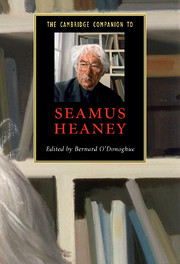Book contents
- Frontmatter
- 1 Introduction
- 2 Seamus Heaney’s Working Titles
- 3 The Context of Heaney’s Reception
- 4 Heaney in Public
- 5 Heaney and the Feminine
- 6 Heaney and Eastern Europe
- 7 Heaney’s Classics and the Bucolic
- 8 Professing Poetry
- 9 Heaney and the Irish Poetic Tradition
- 10 Irish Influence and Confluence in Heaney’s Poetry
- 11 Heaney and Yeats
- 12 Heaney’s Wordsworth and the Poetics of Displacement
- 13 Heaney, Beowulf and the Medieval Literature of the North
- 14 Crediting Marvels
- Guide to Further Reading
- Index
6 - Heaney and Eastern Europe
Published online by Cambridge University Press: 28 March 2009
- Frontmatter
- 1 Introduction
- 2 Seamus Heaney’s Working Titles
- 3 The Context of Heaney’s Reception
- 4 Heaney in Public
- 5 Heaney and the Feminine
- 6 Heaney and Eastern Europe
- 7 Heaney’s Classics and the Bucolic
- 8 Professing Poetry
- 9 Heaney and the Irish Poetic Tradition
- 10 Irish Influence and Confluence in Heaney’s Poetry
- 11 Heaney and Yeats
- 12 Heaney’s Wordsworth and the Poetics of Displacement
- 13 Heaney, Beowulf and the Medieval Literature of the North
- 14 Crediting Marvels
- Guide to Further Reading
- Index
Summary
The poetry of Eastern Europe had a deep and wide-ranging influence on anglophone poetry for a good deal of the Cold War, and the division of the world by two superpowers necessarily created interest among poets about the status of their opposite numbers. The differences across the divide were profound: to varying degrees, the states of the Soviet bloc did not tolerate dissent, and many poets died or spent a long time in jail as a result of this. Poets of the Western world, on the other hand, could enjoy a middle-class lifestyle by teaching literature at university (either as professors of creative writing or academic critics). However, they were haunted by the Russian poet Osip Mandelstam’s aperçu that ‘Poetry is respected only in this country – people are killed for it’; the corollary of this was that although Western poets could write and publish what they wanted, readers did not care as much about what they wrote as, say, Russian readers did about their poets. A story is told that during a public reading Boris Pasternak forgot the lines of a poem, and the audience were able to complete it; a similar situation is difficult to imagine in any English-speaking country during the same period. Such is the background to Seamus Heaney’s statement in 1986 that ‘poets in English have felt compelled to turn their gaze East and have been encouraged to concede that the locus of greatness is shifting away from their language’ (GT 38).
Only now that the dust has settled are critics beginning to document these Cold War poetic transactions. A key element of this critical work is to examine the influence of the East on the poetry and criticism of Seamus Heaney. His position as one of the most important and publicly acclaimed poets in the anglophone world made his advocacy of these poets extremely significant. He wrote about Russian poets including Osip Mandelstam (1891–1938) and Joseph Brodsky (1940–96), Polish poets including Czesław Miłosz (1911–2004) and Zbigniew Herbert (1924–98), and the Czech poet Miroslav Holub (1923–98). Most of these were viewed as ‘poets under pressure’, which meant that they suffered under political regimes and that this conditioned the poetry they wrote as well as its reception. Heaney’s engagement with these Slavic poets was, paradoxically, both profound and superficial.
- Type
- Chapter
- Information
- The Cambridge Companion to Seamus Heaney , pp. 92 - 105Publisher: Cambridge University PressPrint publication year: 2008



